- Home
- H. Beam Piper
The Mercenaries
The Mercenaries Read online
THE MERCENARIES
by
H. BEAM PIPER
Illustrated by Brush
_Once, wars were won by maneuvering hired fighting men; now wars are different--and the hired experts are different. But the human problems remain!_
Duncan MacLeod hung up the suit he had taken off, and sealed his shirt,socks and underwear in a laundry envelope bearing his name andidentity-number, tossing this into one of the wire baskets provided forthe purpose. Then, naked except for the plastic identity disk around hisneck, he went over to the desk, turned in his locker key, and passedinto the big room beyond.
Four or five young men, probably soldiers on their way to town, werecoming through from the other side. Like MacLeod, they wore only theplastic disks they had received in exchange for the metal ones they woreinside the reservation, and they were being searched by attendants whocombed through their hair, probed into ears and nostrils, peered intomouths with tiny searchlights, and employed a variety of magnetic andelectronic detectors.
To this search MacLeod submitted wearily. He had become quite aconnoisseur of security measures in fifteen years' research anddevelopment work for a dozen different nations, but the Tonto BasinResearch Establishment of the Philadelphia Project exceeded anything hehad seen before. There were gray-haired veterans of the old ManhattanProject here, men who had worked with Fermi at Chicago, or withOppenheimer at Los Alamos, twenty years before, and they swore in amusedexasperation when they thought of how the relatively mild regulations ofthose days had irked them. And yet, the very existence of the ManhattanProject had been kept a secret from all but those engaged in it, and itspurpose from most of them. Today, in 1965, there might have been a fewwandering tribesmen in Somaliland or the Kirghiz Steppes who had neverheard of the Western Union's Philadelphia Project, or of the FourthKomintern's Red Triumph Five-Year Plan, or of the Islamic Kaliphate'sAl-Borak Undertaking, or of the Ibero-American Confederation's CavorProject, but every literate person in the world knew that the four greatpower-blocs were racing desperately to launch the first spaceship toreach the Moon and build the Lunar fortress that would insure worldsupremacy.
He turned in the nonmagnetic identity disk at the desk on the other sideof the search room, receiving the metal one he wore inside thereservation, and with it the key to his inside locker. He put on theclothes he had left behind when he had passed out, and filled hispockets with the miscellany of small articles he had not been allowed tocarry off the reservation. He knotted the garish necktie affected by thecivilian workers and in particular by members of the MacLeod ResearchTeam to advertise their nonmilitary status, lit his pipe, and walked outinto the open gallery beyond.
* * * * *
Karen Hilquist was waiting for him there, reclining in one of the metalchairs. She looked cool in the belted white coveralls, with the whiteturban bound around her yellow hair, and very beautiful, and when he sawher, his heart gave a little bump, like a geiger responding to anionizing particle. It always did that, although they had been togetherfor twelve years, and married for ten. Then she saw him and smiled, andhe came over, fanning himself with his sun helmet, and dropped into achair beside her.
"Did you call our center for a jeep?" he asked. When she nodded, hecontinued: "I thought you would, so I didn't bother."
For a while, they sat silent, looking with bored distaste at the swarmof steel-helmeted Army riflemen and tommy-gunners guarding the transferplatforms and the vehicles gate. A string of trucks had been passedunder heavy guard into the clearance compound: they were now unloadingsupplies onto a platform, at the other side of which other trucks werebacked waiting to receive the shipment. A hundred feet of bare concreteand fifty armed soldiers separated these from the men and trucks fromthe outside, preventing contact.
"And still they can't stop leaks," Karen said softly. "And we get blamedfor it."
MacLeod nodded and started to say something, when his attention wasdrawn by a commotion on the driveway. A big Tucker limousine with anO.D. paint job and the single-starred flag of a brigadier general wasapproaching, horning impatiently. In the back seat MacLeod could see aheavy-shouldered figure with the face of a bad-tempered greatDane--General Daniel Nayland, the military commander of Tonto Basin. Theinside guards jumped to attention and saluted; the barrier shot up asthough rocket-propelled, and the car slid through; the barrier slammeddown behind it. On the other side, the guards were hurling themselvesinto a frenzy of saluting. Karen made a face after the receding car andmuttered something in Hindustani. She probably didn't know the literalmeaning of what she had called General Nayland, but she understood thatit was a term of extreme opprobrium.
Her husband contributed: "His idea of Heaven would be a huge researchestablishment, where he'd be a five-star general, and Galileo, Newton,Priestley, Dalton, Maxwell, Planck and Einstein would be techsergeants."
"And Marie Curie and Lise Meitner would be Wac corporals," Karen added."He really hates all of us, doesn't he?"
"He hates our Team," MacLeod replied. "In the first place, we're a lotof civilians, who aren't subject to his regulations and don't have tosalute him. We're working under contract with the Western Union, notwith the United States Government, and as the United States participatesin the Western Union on a treaty basis, our contract has the force of atreaty obligation. It gives us what amounts to extraterritoriality, likeEuropeans in China during the Nineteenth Century. So we have our owntransport, for which he must furnish petrol, and our own armed guard,and we fly our own flag over Team Center, and that gripes him as much asanything else. That and the fact that we're foreigners. So wouldn't helove to make this espionage rap stick on us!"
"And our contract specifically gives the United States the right to takeaction against us in case we endanger the national security," Karenadded. She stuffed her cigarette into the not-too-recently-emptiedreceiver beside her chair, her blue eyes troubled. "You know, some of uscould get shot over this, if we're not careful. Dunc, does it reallyhave to be one of our own people who--?"
"I don't see how it could be anybody else," MacLeod said. "I don't likethe idea any more than you do, but there it is."
"Well, what are we going to do? Is there nobody whom we can trust?"
"Among the technicians and guards, yes. I could think of a scorewho are absolutely loyal. But among the Team itself--the topresearchers--there's nobody I'd take a chance on but Kato Sugihara."
"Can you even be sure of him? I'd hate to think of him as a traitor,but--"
"I have a couple of reasons for eliminating Kato," MacLeod said. "In thefirst place, outside nucleonic and binding-force physics, there are onlythree things he's interested in. Jitterbugging, hand-painted neckties,and Southern-style cooking. If he went over to the Komintern, hewouldn't be able to get any of those. Then, he only spends about halfhis share of the Team's profits, and turns the rest back into the TeamFund. He has a credit of about a hundred thousand dollars, which he'dlose by leaving us. And then, there's another thing. Kato's father waskilled on Guadalcanal, in 1942, when he was only five. After that he wasbrought up in the teachings of Bushido by his grandfather, an old-timesamurai. Bushido is open to some criticism, but nobody can show wheredouble-crossing your own gang is good Bushido. And today, Japan isallied with the Western Union, and in any case, he wouldn't help theKomintern. The Japs'll forgive Russia for that Mussolini back-stab in1945 after the Irish start building monuments to Cromwell."
A light-blue jeep, lettered _MacLeod Research Team_ in cherry-red, wasapproaching across the wide concrete apron. MacLeod grinned.
"Here it comes. Fasten your safety belt when you get in; that's Ahmeddriving."
Karen looked at her watch. "And it's almost time for dinner. You know, Idread the thought
of sitting at the table with the others, and wonderingwhich of them is betraying us."
"Only nine of us, instead of thirteen, and still one is a Judas,"MacLeod said. "I suppose there's always a place for Judas, at anytable."
* * * * *
The MacLeod Team dined together, apart from their assistants andtechnicians and students. This was no snobbish attempt atclass-distinction: matters of Team policy were often discussed at thebig round table, and the more confidential details of their work. Peoplewho have only their knowledge and their ideas to sell are wary aboutbandying either loosely, and the six men and three women who faced eachother across the twelve-foot diameter of the teakwood table had no otherstock-in-trade.
They were nine people of nine different nationalities, or they were ninepeople of the common extra-nationality of science. That Duncan MacLeod,their leader, had grown up in the Transvaal and his wife had been bornin the Swedish university town of Upsala was typical not only of theirown group but of the hundreds of independent research-teams that hadsprung up after the Second World War. The scientist-adventurer may havebeen born of the relentless struggle for scientific armament supremacyamong nations and the competition for improved techniques amongindustrial corporations during the late 1950s and early '60s, but he hadbeen begotten when two masses of uranium came together at the top of asteel tower in New Mexico in 1945. And, because scientific research ispre-eminently a matter of pooling brains and efforts, the independentscientists had banded together into teams whose leaders acquired powergreater than that of any _condottiere_ captain of Renaissance Italy.
Duncan MacLeod, sitting outwardly relaxed and merry and secretlywatchful and bitterly sad, was such a free-captain of science. One byone, the others had rallied around him, not because he was a greaterphysicist than they, but because he was a bolder, more clever, lessscrupulous adventurer, better able to guide them through the maze ofinternational power-politics and the no less ruthless if less nakedlyviolent world of Big Industry.
There was his wife, Karen Hilquist, the young metallurgist who, beforeshe was twenty-five, had perfected a new hardening process for SKF andan incredibly tough gun-steel for the Bofors works. In the few minutessince they had returned to Team Center, she had managed to change hercoveralls for a skirt and blouse, and do something intriguing with herhair.
And there was Kato Sugihara, looking younger than his twenty-eightyears, who had begun to demonstrate the existence of whole orders ofstructure below the level of nuclear particles.
There was Suzanne Maillard, her gray hair upswept from a face that hadnever been beautiful but which was alive with something rarer than merebeauty: she possessed, at the brink of fifty, a charm and smartness thatmany women half her age might have envied, and she knew more aboutcosmic rays than any other person living.
And Adam Lowiewski, his black mustache contrasting so oddly with hissilver hair, frantically scribbling equations on his doodling-pad, asthough his racing fingers could never keep pace with his brain, andexplaining them, with obvious condescension, to the boyish-lookingJapanese beside him. He was one of the greatest of living mathematiciansby anybody's reckoning--_the_ greatest, by his own.
And Sir Neville Lawton, the electronics expert, with thinning red-grayhair and meticulously-clipped mustache, who always gave the impressionof being in evening clothes, even when, as now, he was dressed in fadedkhaki.
And Heym ben-Hillel, the Israeli quantum and wave-mechanics man, hisheaping dinner plate an affront to the Laws of Moses, his white hair afluffy, tangled chaos, laughing at an impassively-delivered joke theEnglish knight had made.
And Rudolf von Heldenfeld, with a thin-lipped killer's mouth and afrozen face that never betrayed its owner's thoughts--he was thespecialist in magnetic currents and electromagnetic fields.
And Farida Khouroglu, the Turkish girl whom MacLeod and Karen had foundbegging in the streets of Istanbul, ten years ago, and who had grown upfollowing the fortunes of the MacLeod Team on every continent and in ascore of nations. It was doubtful if she had ever had a day's formalschooling in her life, but now she was secretary of the Team, with agrasp of physics that would have shamed many a professor. She had grownup a beauty, too, with the large dark eyes and jet-black hair andpaper-white skin of her race. She and Kato Sugihara were very much inlove.
A good team; the best physics-research team in a power-mad,knowledge-hungry world. MacLeod thought, toying with the stem of hiswineglass, of some of their triumphs: The West Australia Atomic PowerPlant. The Segovia Plutonium Works, which had got them all titled asGrandees of the restored Spanish Monarchy. The sea-water chemicalextraction plant in Puerto Rico, where they had worked for AssociatedEnterprises, whose president, Blake Hartley, had later become Presidentof the United States. The hard-won victory over a seemingly insolubleproblem in the Belgian Congo uranium mines----He thought, too, of thedangers they had faced together, in a world where soldiers must use theweapons of science and scientists must learn the arts of violence. Ofthe treachery of the Islamic Kaliphate, for whom they had once worked;of the intrigues and plots which had surrounded them in Spain; of themany attempted kidnappings and assassinations; of the time in Basra whenthey had fought with pistols and tommy guns and snatched-up clubs andflasks of acid to defend their laboratories.
A good team--before the rot of treason had touched it. He could almostsmell the putrid stench of it, and yet, as he glanced from face to face,he could not guess the traitor. And he had so little time--
* * * * *
Kato Sugihara's voice rose to dominate the murmur of conversation aroundthe table.
"I think I am getting somewhere on my photon-neutrino-electroninterchange-cycle," he announced. "And I think it can be correlated tothe collapsed-matter research."
"So?" von Heldenfeld looked up in interest. "And not with the problem ofwhat goes on in the 'hot layer' surrounding the Earth?"
"No, Suzanne talked me out of that idea," the Japanese replied. "That'sjust a secondary effect of the effect of cosmic rays and solarradiations on the order of particles existing at that level. But I thinkthat I have the key to the problem of collapsing matter to plate thehull of the spaceship."
"That's interesting," Sir Neville Lawton commented. "How so?"
"Well, you know what happens when a photon comes in contact with theatomic structure of matter," Kato said. "There may be an elasticcollision, in which the photon merely bounces off. Macroscopically,that's the effect we call reflection of light. Or there may be aninelastic collision, when the photon hits an atom and knocks out anelectron--the old photoelectric effect. Or, the photon may be retainedfor a while and emitted again relatively unchanged--the effect observedin luminous paint. Or, the photon may penetrate, undergo a change to aneutrino, and either remain in the nucleus of the atom or pass throughit, depending upon a number of factors. All this, of course, is oldstuff; even the photon-neutrino interchange has been known since themid-'50s, when the Gamow neutrino-counter was developed. But now we cometo what you have been so good as to christen the Sugihara Effect--theneutrino picking up a negative charge and, in effect, turning into anelectron, and then losing its charge, turning back into a neutrino, andthen, as in the case of metal heated to incandescence, being emittedagain as a photon.
"At first, we thought this had no connection with the spaceshipinsulation problem we are under contract to work out, and we agreed tokeep this effect a Team secret until we could find out if it hadcommercial possibilities. But now, I find that it has a directconnection with the collapsed-matter problem. When the electron losesits negative charge and reverts to a neutrino, there is a definiteaccretion of interatomic binding-force, and the molecule, or thecrystalline lattice or whatever tends to contract, and when the neutrinobecomes a photon, the nucleus of the atom contracts."
* * * * *
Heym ben-Hillel was sitting oblivious to everything but his youngcolleague's words, a slice of the flesh of the unclean
beast impaled onhis fork and halfway to his mouth.
"Yes! Certainly!" he exclaimed. "That would explain so many things Ihave wondered about: And of course, there are other forces at workwhich, in the course of nature, balance that effect--"
"But can the process be controlled?" Suzanne Maillard wanted to know."Can you convert electrons to neutrinos and then to photons insufficient numbers, and eliminate other effects that would causecompensating atomic and molecular expansion?"
Kato grinned, like a tomcat contemplating the bones of a fish he hasjust eaten.
"Yes, I can. I have." He turned to MacLeod. "Remember those bullets Igot from you?" he asked.
MacLeod nodded. He handloaded for his .38-special, and like all advancedcases of handloading-fever, he was religiously fanatical aboutuniformity of bullet weights and dimensions. Unlike most handloaders, hehad available the instruments to secure such uniformity.
"Those bullets are as nearly alike as different objectscan be," Kato said. "They weigh 158 grains, and that meansone-five-eight-point-zero-zero-zero-practically-nothing. The diameter is.35903 inches. All right; I've been subjecting those bullets todifferent radiation-bombardments, and the best results have given me abullet with a diameter of .35892 inches, and the weight is unchanged. Inother words, there's been no loss of mass, but the mass had contracted.And that's only been the first test."
"Well, write up everything you have on it, and we'll lay out furtherexperimental work," MacLeod said. He glanced around the table. "So far,we can't be

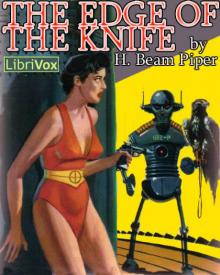 The Edge of the Knife
The Edge of the Knife Genesis
Genesis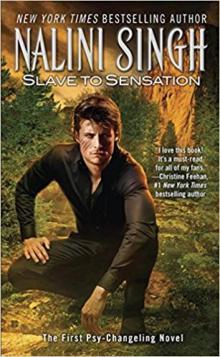 A Slave is a Slave
A Slave is a Slave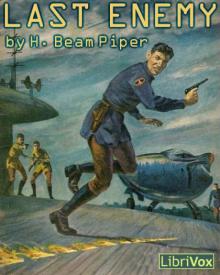 Last Enemy
Last Enemy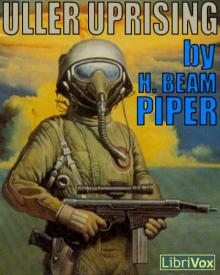 Uller Uprising
Uller Uprising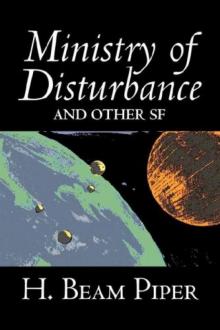 Ministry of Disturbance
Ministry of Disturbance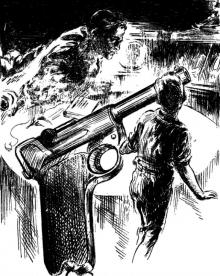 Time and Time Again
Time and Time Again The Mercenaries
The Mercenaries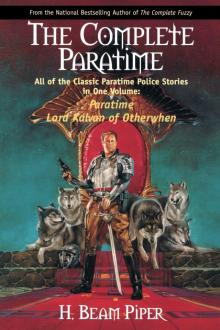 Police Operation
Police Operation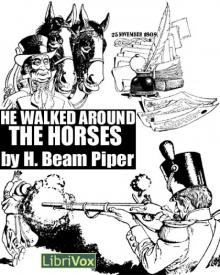 He Walked Around the Horses
He Walked Around the Horses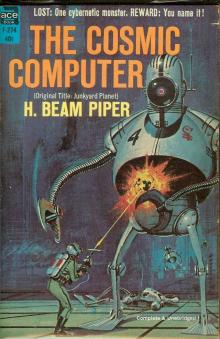 Time Crime
Time Crime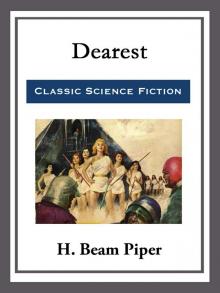 Dearest
Dearest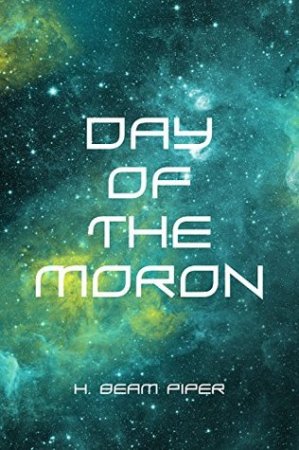 Day of the Moron
Day of the Moron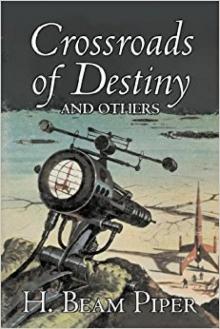 Crossroads of Destiny
Crossroads of Destiny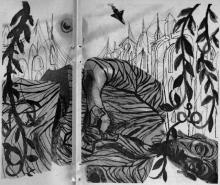 Graveyard of Dreams
Graveyard of Dreams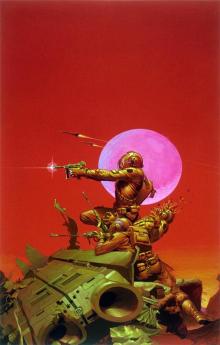 The Cosmic Computer
The Cosmic Computer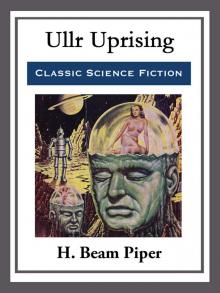 Ullr Uprising
Ullr Uprising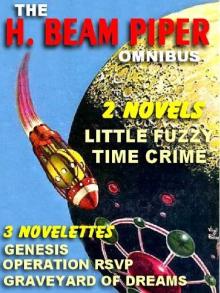 Operation R.S.V.P.
Operation R.S.V.P.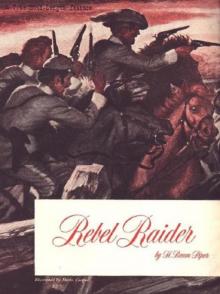 Rebel Raider
Rebel Raider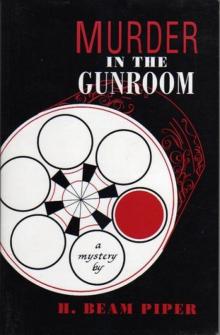 Murder in the Gunroom
Murder in the Gunroom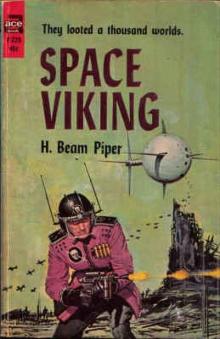 Space Viking
Space Viking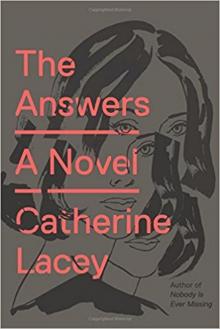 The Answer
The Answer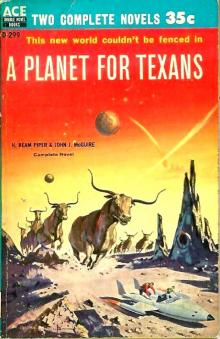 A Planet for Texans (aka Lone Star Planet)
A Planet for Texans (aka Lone Star Planet)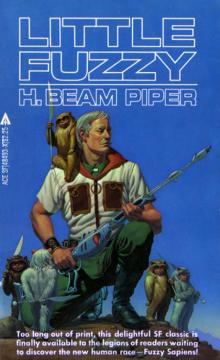 Little Fuzzy
Little Fuzzy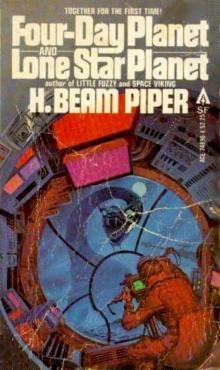 Four-Day Planet
Four-Day Planet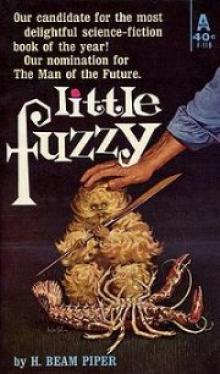 Little Fuzzy f-1
Little Fuzzy f-1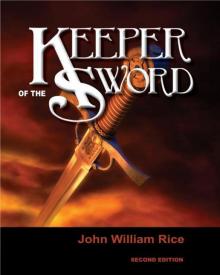 Keeper
Keeper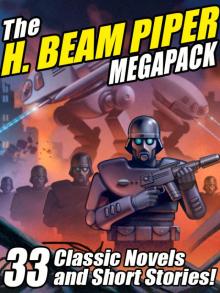 The H. Beam Piper Megapack
The H. Beam Piper Megapack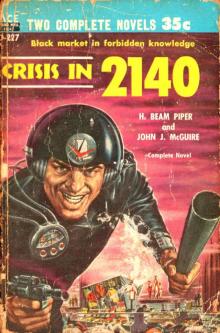 H. Beam Piper
H. Beam Piper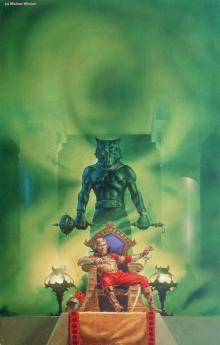 Lord Kalvan of Otherwhen
Lord Kalvan of Otherwhen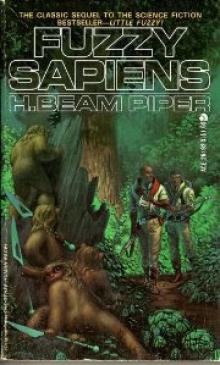 Fuzzy Sapiens f-2
Fuzzy Sapiens f-2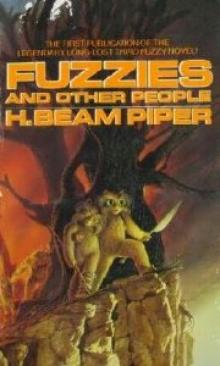 Fuzzies and Other People f-3
Fuzzies and Other People f-3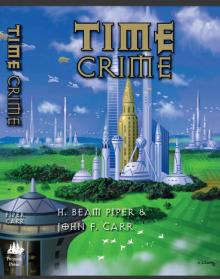 TIME PRIME
TIME PRIME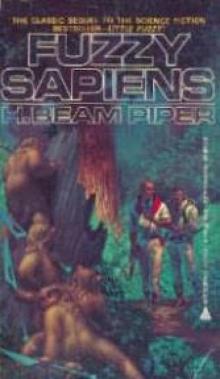 Fuzzy Sapiens
Fuzzy Sapiens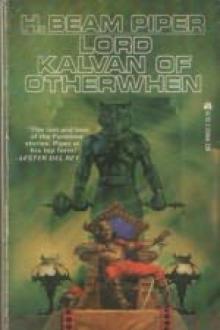 Lord Kalvan of Otherwhen k-1
Lord Kalvan of Otherwhen k-1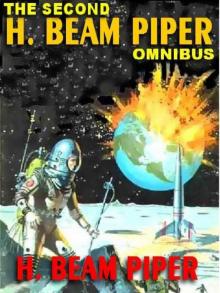 The Second H. Beam Piper Omnibus
The Second H. Beam Piper Omnibus